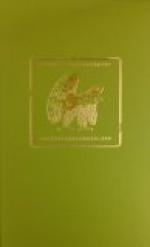He listened a moment, then: “Yes, likely I’ll change my mind, if I get so’s I can drive her all right by three p.m. I’m going east of the mountains, and if I buy I’ve got to ship her on the four-ten train—Yes, I mean the little one with a seat to accommodate two, with a place to carry a trunk behind. Now get busy and rush her down. I’ve got some errands to do, and I want you to hurry me around; then we’ll get away from the crowd out on the boulevard where I can have a clear track to break her on.”
The sale was made, and the mining man must have applied himself successfully to his lesson, for the following morning, when the red car spun out of Wenatchee and up the lifting valley road, a snug steamer-trunk was stowed in the box behind, and Banks at the steering gear was traveling alone. To be sure the rising curves were made in sudden spurts and jerks, but his lack of skill was reinforced by a tireless vigilance gathered through breaking days of driving and mushing over hazardous trails. And he had made an early start; few wayfarers were yet astir. But at last, high up where the track doubled the summit of a slope that lifted in a bluff overhead, and on the other hand dropped precipitously to the river, the little man barely averted catastrophe. The driver and the vehicle were hidden by the curve, but at his warning honk, two percherons that blocked the way halted and, lunging at his repeated note, crowded back on the team they led. Then a woman’s voice shrilled: “I’ve got the heaviest load; you give me right of way.”
Banks sprang out and ran forward past the horses. The driver, dressed in a skirt and blouse of khaki, was seated on a load of lumber. She held the reins high in yellow-gauntleted hands, and a rope of loosened red hair hung below a smart campaign hat. “I can’t back,” she exclaimed aggressively. “You got to give me right of way.”
“Ain’t there a man with the outfit?” he asked uncertainly.
“No,” she snapped. “Do I look like I need one?” But she hurried on tremulously: “My husband’s running the mill night and day, and Bryant, down the valley, had to have his boxes for the apple crop. He said send the boards down, and he’d let a couple of his Japs knock ’em together. So I thought with an early start and a clear track, I could drive. But you’ve got to turn out. I’ve got the heavy load.”
Banks shook his head.
“It’s my first trip,” he said dubiously, “and I ain’t learned to back her only enough to turn ’round; and it’s too narrow. But I used to drive pretty good seven or eight years ago; and I’ve been managing a dog team off and on ever since. Let me climb up there and back your load.”
“You can’t do it,” she cried. “It’s up-grade and a mean curve, and that nigh leader, for a first-class draught horse, has the cussedest disposition you ever saw. You can’t back him short of a gunshot under his nose, and you got to get that buzz-wagon of yours out of sight before I can get him past.”




